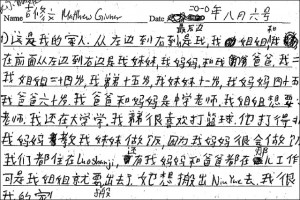Givner ’10 to Experience Chinese Culture First Hand

On Sept. 1, Matthew Givner ’10 became one of 19 Princeton-in-Asia fellows from around the world who is teaching English in a Chinese province.
Givner moved to Dalain, a city of 6.5 million people located 288 miles east of Beijing. There, he is teaching English, writing, reading and speaking to students at Dalian University of Technology with three other fellows. He teaches 14 class hours per week.
Givner learned of the program through a family friend and Wesleyan’s Career Resource Center. He attended two information sessions on the program at the Career Resource Center and decided to apply. Two months after interviewing with program representatives, Givner received the news that he was accepted.
“I was obviously thrilled that I no longer had to worry about being bored or unemployed following graduation, but I was admittedly shell-shocked by the sudden realization that I’d committed myself to living in China for a year,” he says. “After attending a English as Foreign Language training course, and a program orientation hosted by Princeton, I’m still terribly nervous but also incredibly excited about my upcoming year abroad.”
Preparing for the year in China involved a summer of intense study. For eight weeks, Givner immersed himself in the Mandarin language at the Monterey International Institute’s Summer Intensive Language Program.

Prior to the program, Givner was only able to write in Pinyin, which is using English letters to make Mandarin sounds. Afterwards, he was able to answer six questions entirely in Chinese characters.
“The main reason behind my decision to apply for this fellowship was my desire to learn Chinese through immersion, and this summer course provided an invaluable foundation for my language skills,” he says. “My Chinese vocabulary is roughly equivalent to that of a 4th or 5th grader, I’d imagine. From what I’ve heard it takes several years to get even close to fluent in Mandarin, but I hope that living in China for a year will help expedite the process. At the moment, I can ask simple questions and generally get around, but I’m still nowhere near where I’d like to be.”
In the classroom, Givner isn’t allowed to speak a word of Mandarin.
“As college students, they’re all relatively advanced in terms of speaking English, so it is for the students’ benefit that I speak English to them as much as possible,” he says.
Nina Sheth ’10 also is a Princeton-in-Asia fellow this year.
She and Givner join a long list of Wesleyan alumni who became PIA fellows after graduating. Jonathan Haagen ’03 was one of the first fellows, teaching English and American history in Shenyang. He is now living in Beijing. History major Ed Wu ’04 worked in Beijing as a fellow at WildChina, an adventure travel company. Afterwards, he spent a second year on a PIA business fellowship working in a bank in Thailand. He’s currently working in the microfinance and banking sector in various cities across China.
Princeton-in-Asia provides transformative, service-oriented experiences for talented graduates who live and work in Asia. The first PiA “fellowships” consisted of a handful of Princeton University graduates who went to China in the late 1890s to do relief work and teach English; the program has since expanded considerably in size and scope throughout Asia.

